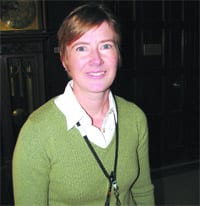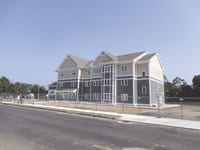‘Small Successes, Giant Leaps’ Every Day Is Different for Dr. Pixie Plummer
Dr. Pixie Plummer says can understand — almost — why people might refrain from associating work with those suffering from neurodevelopmental disabilities with the word fun.
But she invites them to spend a day or even a few hours with her as she cares for children and adults with cerebral palsy, spina bifida, Down syndrome, autism, and other afflictions to see why she does it.
“I laugh a lot, and my patients teach me to laugh,” she told The Healthcare News, adding that she finds her work with her patients and their family members and caregivers to be extremely rewarding and, in many ways, uplifting. That’s because progress often comes slowly and in small increments, but when it is achieved, there is a great sense of accomplishment among all those involved.
“I tell people all the time that, in this kind of work, every small success feels like a giant leap, because it means so much,” she said, adding that over the years she has, through her patients, gained new perspective into such concepts as success and happiness.
“It’s about opening your mind to what it means to be successful, and to see how people are thriving even when others assume that life is miserable,” said Plummer in describing her work and her patients’ lives. “There are all kinds of ways to be happy and live well, and I learn more about that from my patients than I do from anyone else.”
Plummer, a native of Iowa who came to Baystate Medical Center for her residency (more on that later) and fell in love with the region and thus returned here after a fellowship in Neurodevelopmental Disabilities, works mostly at the Mason Square Neighborhood Health Center. There, she treats patients of all ages, and in concert with those aforementioned caregivers and family members, who often play crucial roles in helping to communicate problems and challenges and achieve progress.
“They can read the eyes and their facial expressions,” she explained. “And if I listen to them, then I can know more and understand more. Usually, it’s a group effort.”
In this latest installment of its ‘Today’s Physician’ series, The Healthcare News talks with Plummer about these group efforts, and also about why she chose this specialty — and why each day at her office is different and special.
Learning and Teaching
Plummer remembers having to get out a map and find Springfield, Mass. when she started considering Baystate for her residency.
She didn’t really know exactly where the hospital was, from a geographic standpoint, but she certainly knew of it, and, more specifically, of its reputation with regard to a category of residency known as medicine pediatrics, or ‘med-peds.’ As the name implies (to those in health care, anyway), this connotes a blending of internal medicine and pediatrics, which is exactly what Plummer was looking for as she contemplated the direction of her career in medicine.
“I always wanted to be a teacher,” she recalled. “But then, I loved science and I loved working with kids, so someone once suggested that I think seriously about becoming a pediatrician, because then I could always be learning and teaching at the same time.”
It was while she was in high school that Plummer started doing just that. She earned a bachelor’s degree from Grinnell College in Iowa, and her medical degree at the University of Iowa. And while she visited a few hospitals concerning a residency, she had her sights firmly set on Baystate, and on ‘Match Day’ received the good news that she would be heading east.
From Baystate, Plummer moved on to a fellowship in Neurodevelopmental Disabilities at Children’s Hospital, a three-year stint that ended in 2007. Later that year, she was invited by Dr. Ed Reiter, the now-retired chairman of Baystate’s Pediatrics unit, to return to Springfield, and she took him up on the offer.
When asked to describe a typical day in her life — and work — Plummer emphasized that, while there my indeed be something approaching ‘typical,’ each day brings new wrinkles.
“Every day, every patient is different,” she explained. “Every day is fun and exciting and unpredictable, because every one of my patients is unique.”
As a way to explain what she does and how she does it, Plummer used the example of a 34-year-old man with Down syndrome who was referred to her office by the individual’s primary-care physician.
“He’s very nervous about physical exams,” Plummer said of her new patient, “but his primary-care provider wants to know if there’s anything else to be looking for in terms of his diagnosis. Maybe he’s not happy in his job program, so both he and his physician are wondering if there are other supports that might be needed.
“I’ll spend an hour or more just getting a history and a good picture of what life is like for that gentleman,” she continued, “and get some basic recommendations on screenings or things to look out for with regard to Down syndrome. Or maybe I’ll notice that, if we can find a way to help him communicate more comfortably — both at home and at his job program — then he could be happier. It ends up being a combination of health review and then talking about other therapies or community-based resources.”
Elaborating, Plummer described her work as “good general medicine, but with a twist.”
“Sometimes it means getting creative,” she continued, “like doing some of your exam lying on the floor or playing while you do the exam.”
Plummer told The Healthcare News that, to achieve those small successes, or ‘giant leaps,’ as she called them, she and other specialists in this field must work in tandem with family members and caregivers.
Indeed, while most with neurodevelopmental disorders eventually progress to attain what she called “their own voice,” caregivers and family members often are called upon to add additional voice and perspective.
“Sometimes I think that, for parents and caregivers, having the time to just say what they’re noticing and have someone listening is very valuable,” she said. “Especially when, in general, we’re all having to rush as we work.
“Often, I find myself reassuring them to trust their instincts and continue to tell people what they notice,” she continued, “and to not question their judgment. Because, without them, we don’t get a good picture of the true person; they know their kids or their loved one better than anyone.”
Developing Story
Plummer, who hikes extensively in her free time and particularly enjoys Mount Tom, knows that treating those with neurodevelopmental disabilities can, like her hobby, involve some uphill climbs.
But in both cases, it’s not the destination she remembers as much as the journey to reach it.
And it’s the journey that enables her to describe her work with a word that most not familiar with this specialty wouldn’t consider appropriate: fun.



Comments are closed.